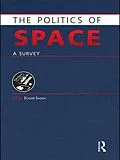The pace of space exploration has long been dictated by political motivations. This book helps to explain why this is so in the post-Cold War era. Combining essays, a glossary of terms, tables and statistics, this new title from Routledge comes as a welcome addition to this increasingly popular topic.
The book:
- covers theories and concepts, as well as current issues
- gives a background to international and national space agencies
- contains essays that cover military, commercial and governmental actors in space politics.
Zusammenfassung
What is the trouble with schools and why should we want to make 'school trouble'?Schooling is implicated in the making of educational and social exclusions and inequalities as well as the making of particular sorts of students and teachers. For this reason schools are important sites of counter- or radical- politics. In this book, Deborah Youdell brings together theories of counter-politics and radical traditions in education to make sense of the politics of daily life inside schools and explores a range of resources for thinking about and enacting political practices that make 'school trouble'.The book offers a solid introduction to the much-debated issues of 'intersectionality' and the limits of identity politics and the relationship between schooling and the wider policy and political context. It pieces together a series of tools and tactics that might destabilize educational inequalities by unsettling the knowledges, meanings, practices, subjectivities and feelings that are normalized and privileged in the 'business as usual' of school life. Engaging with curriculum materials, teachers' lesson plans and accounts of their pedagogy, and ethnographic observations of school practices, the book investigates a range of empirical examples of critical action in school, from overt political action pursued by educators to day-to-day pedagogic encounters between teachers and students. The book draws on the work of Michel Foucault, Judith Butler, Ernesto Laclau and Chantel Mouffe, and Gilles Deleuze and Felix Guattari to make sense of these practices and identify the political possibilities for educators who refuse to accept the everyday injustices and wide-reaching social inequalities that face us.School Trouble appears at a moment of political and economic flux and uncertainty, and when the policy moves that have promoted markets and private sector involvement in education around the globe have been subject to intense scrutiny and critique. Against this backdrop, renewed attention is being paid to the questions of how politics might be rejuvenated, how societies might be made fair, and what role education might have in pursing this. This book makes an important intervention into this terrain. By exploring a politics of discourse, an anti-identity politics, a politics of feeling, and a politics of becoming, it shows how the education assemblage can be unsettled and education can be re-imagined. The book will be of interest to advanced undergraduate and postgraduate students and scholars in the fields of education, sociology, cultural studies, and social and political science as well as to critical educators looking for new tools for thinking about their practice.
Inhalt
CONTENTS PART I: ESSAYS Politics of Space - ELIGAR SADEH National Security Space - PETER L. HAYS Developed Space Programmes - LAURENCE NARDON Moderate Space Powers - WADE L. HUNTLEY Commercial Space Actors - DAVID CHEN AND MOLLY K. MACAULEY International Organizations in Civil Space Affairs - HENRY R. HERTZFELD Non-governmental Space Organizations - JAMES A. VEDDA Public Sector Actors - ROGER B. HANDBERG PART II: A - Z GLOSSARY: Survey of major space organizations in the civil, commercial and military space sectors - CHRISTIAN SADEH PART III: FIGURES AND TABLES
